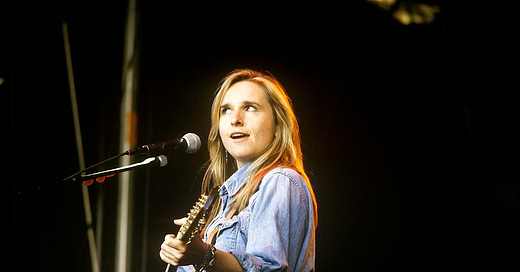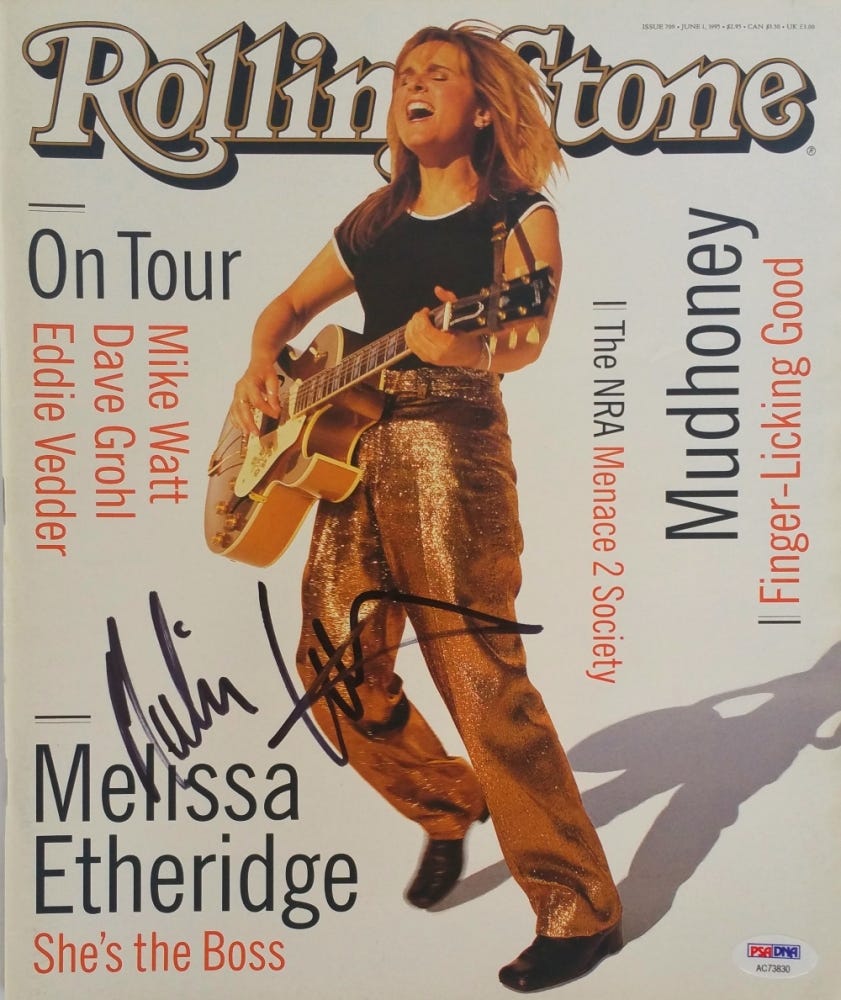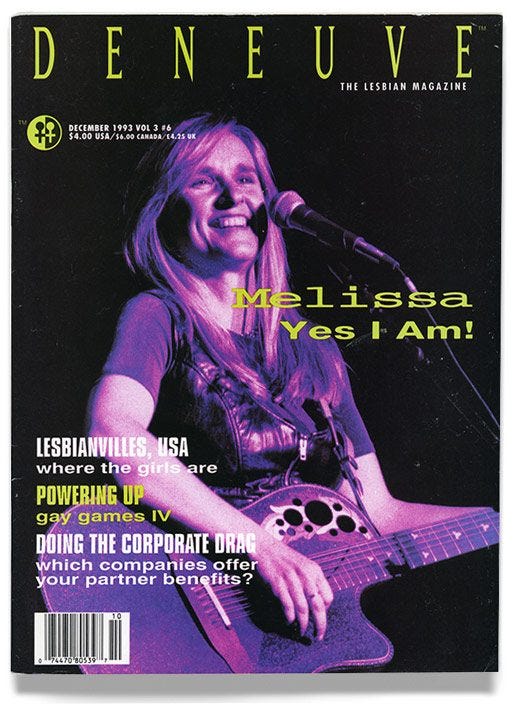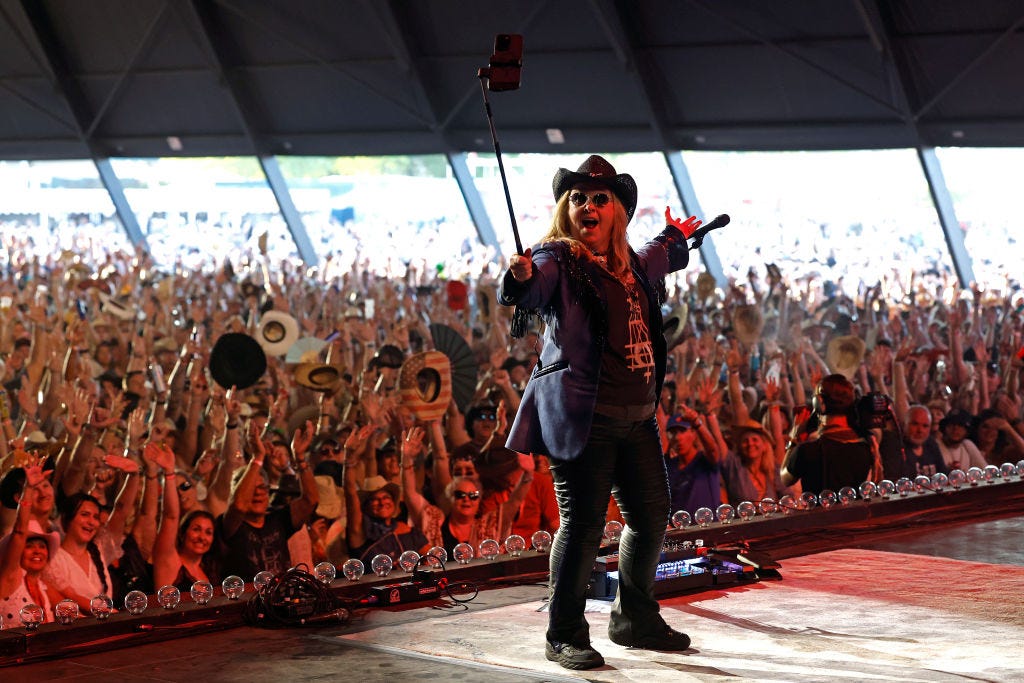All-American Girl: Melissa Etheridge's "Yes I Am" Turns 30
"Please, baby, can’t you see I’m trying to explain?"
Last week while in the Bay, I dragged my (ex-girl)friend to the White Horse in Oakland for queer karaoke. Back when we were together in the early aughts, we would frequent Sunday nights in Chicago at a dyke bar called Stargaze. Jamie’s song was always Suzanne Vega’s “Tom’s Diner,” and back then, my go-to was “You Oughta Know,” a crowd-pleaser, which is always what I am looking for — audience participation. But since then, I’ve explored others and found myself coming back, time and time again, to Melissa Etheridge.
Sure, it’s partially because I’m an alto and Melissa’s trademark rasp suits my range, but I defy you to sing “I Wanna Come Over” to any bar full of passive listeners and not have them singing their demand to break into your home and heart by the first chorus break. The incessant longing, the promise in the build to a dramatic burst — it’s a near-perfect song and I love to sing it.
It’s usually a toss-up between that song, from 1995’s Your Little Secret, or one from Yes I Am, an album that turns 30 years old today. There are reasons every karaoke bar has “Come to My Window,” “If I Wanted To” and “I’m The Only One” — they were massive radio smashes and subsequent videos were in heavy rotation on MTV. It was her fourth studio album but her biggest debut on the charts, making history with two of her hits competing in the Best Rock Song categories at the Grammys, losing to one of her idols, Bruce Springsteen for his least rock song ever, “Streets of Philadelphia.” Still, she won a Grammy for Best Female Rock Vocal Performance, which was nice, of course, but underscored that Melissa could be a winner in only one category: Female.
Melissa Etheridge was, yes she is, a woman — a woman in rock, dare I say. And she wasn’t alone (which she made sure to make note of), but she was still singled out, as most marginalized artists are, as anomalies when successful; one-offs who can’t possibly have longevity, especially not (yikes!) a LESBIAN.
Yes I Am was simultaneously notable for its release just as Melissa came out publicly. Inspired by her friend kd Lang, Melissa took the mic at at Bill Clinton’s Triangle Ball and announced, in a moving, joyful moment, “I’m very proud to have been a lesbian all my life.”
The album’s title often gets conflated with her coming out, as if Melissa’s saying what or who she is can only be in reference to her sexual identity. Frustrating as that misassumption might have been, Melissa’s sexuality is ingrained into the emotional intensity of her songwriting and her performances alike, live or recorded. And gratefully, Melissa Etheridge was never one to follow the well-trodden path of distancing herself from her womanhood or her queerness in order to be more palatable. Though the mainstream press would focus largely on her being famous and gay, their spotlight also meant they also had to cover her music — and there was little denying Yes I Am was one of the best albums of 1993.
Accompanied by lang and the advent of lesbian chic, Etheridge was supported by a community thirsty for rock ‘n’ roll women who could translate passion and pain into palpable performance. (Having seen her live, I can attest to Melissa’s worthiness of rock idol status — kd too, for that matter.) Even when she wasn’t present in her own videos, Melissa’s work dripped with her point of view, and it was unabashedly fervent the way everyone but women, especially, can experience relationships. Melissa could turn the trope of a woman obsessed on her head and make her seem like the sanest voice in the room. She has wants and needs — fires burning inside of her. Please, baby, can’t you see I’m trying to explain?
With the talent, drive and a burgeoning music career since near childhood, Melissa Etheridge didn’t need to come out in order to get press. She’d been doing just fine garnering record sales from radio play and Grammy nods, so that, eventually, publications like Rolling Stone, despite their reluctance, had to put her on the cover.
“Rock radio would say, ‘We can’t play that because we already have a woman on the radio,’ and ‘We couldn’t play two women in the same hour. We might lose our male following,’” Melissa told Rolling Stone in 1995. “But all of a sudden the whole lid was blown off, and these women – Edie Brickell and Tracy Chapman, Toni Childs, Natalie Merchant, Michelle Shocked and the Indigo Girls – were selling records. And people were coming to our concerts, and they were requesting our songs on radio, and radio changed. That’s the way America works. The public ultimately says, ‘This is what we want.’ The world was ready for strong women’s inspired music.”
Importantly, Melissa didn’t downplay her new role as a lesbian poster child — she deemed it equally as important as her music, a position rarely taken by openly gay artists. She made her feminism and her lesbianism a part of her platform, appearing as the first “celebrity covergirl” for Deneuve (later Curve) where she told the reporter she’d fired her publicist for dismissing requests from queer media.
"I started looking around a bit, and my eyes just were opened a bit. And I started realizing that this has a lot to do with me. Women's rights, gay rights have everything to do with me," Melissa told Deneuve. "I was realizing that I was, um, undermining myself as a feminine entity and not taking a hold of that power, not saying, 'You know what? There's not equality.' So, there's a lot of power in saying I'm a feminist. And I think that the backlash of the '80s was to make feminism a bad word, and I just think that takes so much power away from us, and feminism is a beautiful word."
While it might seem feminism is claimed easier by pop and rock stars alike in 2023, that wasn’t not the case three decades ago, when The Atlantic deemed feminism as having “an identity crisis” and Melissa’s first interview in Rolling Stone were all questions pertaining to her being a woman (including plans for motherhood and pregnancy). When asked about the “advantages in the business to being a woman,” she answered: “No, not really. The music business is hard, and it’s a business, and as long as you make a product that the people want and your company wants to sell, then you’ll be successful, whether you’re male or female.”
Female, though, is where Melissa (now 62 and still touring) often gets maligned. Every time she’s been nominated for a Grammy that is not gender specific, she’s lost to a man: Springsteen (for the second time in 2005 ), Santana (2000), and Randy Newman (2007). Her own website’s biography calls her “Melissa Etheridge is one of rock music's great female icons.” And she is, undoubtedly so, but it’s also still so clear, 30 years after the success of Yes I Am, that Melissa has never gotten the respect she deserved as a bonafide rock star — a songwriter, singer, and guitar player that has endured despite all attempts to keep her out of the canon.
The best-known songs from Yes I Am are about love, lust and longing — some of ME’s trademark themes — but there are also songs like the rousing “All-American Girl” (She's an all-American girl/An all-American girl/And she will live and die in this man's world/An all American girl).
"I like singing about women's issues,” she told Deneuve. “I don't think in rock music that they're ever addressed or ever brought up,” she said. “I like putting it in a strong rock 'n' roll vehicle where you can move to it.”
Despite all of her willingness to be all she was (and remains to be), Melissa doesn’t get enough credit for her role in the pre-Lilith Fair period that re-established women rock artists as a possibility. She was a critical part of establishing the often-ignored connections between women’s bars and festivals and proving both gay and women artists can be successful in the mainstream, creating communities of committed fan bases through her consistent touring and dedication. She stuck with her strongly-held political convictions and continues to prevail, despite cancer diagnoses, high-profile divorces, losing her son, and, of course, rampant sexism and homophobia. She’s never wavered in her strongly-held convictions and support of other women and marginalized artists, something that deserves celebration as much as Yes I Am turning 30.
The algorithm knows me well, and has been telling me all about Melissa’s new Broadway show, My Window, for weeks now. Reviews indicate that Melissa hasn’t shied away from any of the things she’s always been. In fact, it sounds as if she’s leaned all the way in, telling her stories of doing all the things people said she couldn’t do or be, highlighting her history of discovery at Long Beach’s gay bar Que Sera alongside the more recognizable trials she’s shared publicly in her first memoir, The Truth Is… and brand new book, Talking to My Angels.
"Yes I Am was my return to the core of who I am,” Melissa writes in The Truth Is… “It felt real. It felt very whole. This is who I am, and the songs on that album are really strong pieces of me."
They are pieces of me too, Melissa, and everyone else in any American karaoke bar on any given night.








The mid to late 80s and the whole 90s was just a great musical Era for women fronted groups, singer songwriters and women who were unapologetically Lesbians or Bisexuals.
Though "The L World" introduced a lot of us in the Midwest to the women's music scene from the West and East coast.
Melissa Ethridge made a way for
Brandi Carlile to become a Superstar.
Now in the Post Pandemic Era, we need to get our shit together to start Lilith Fair again.